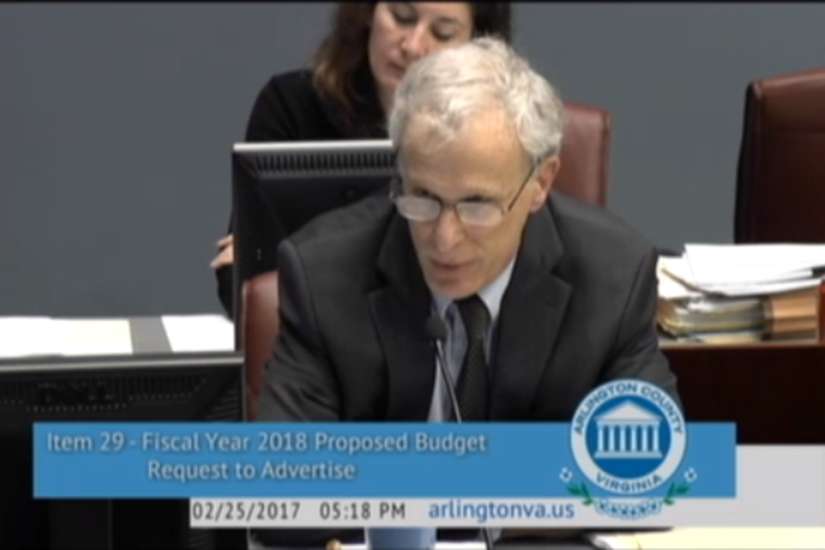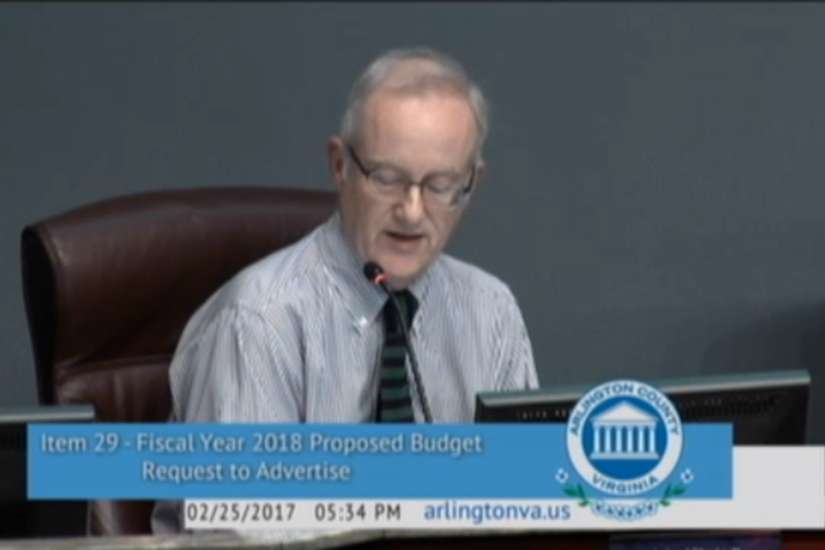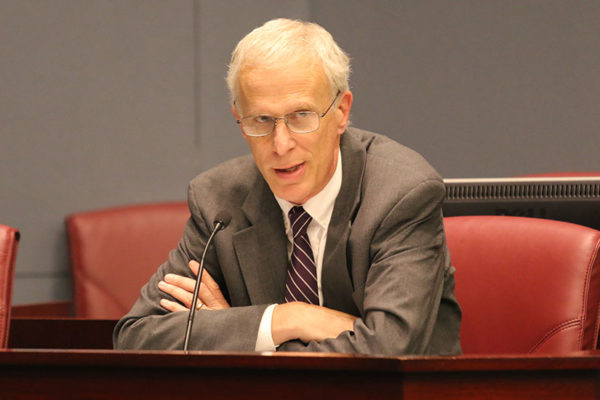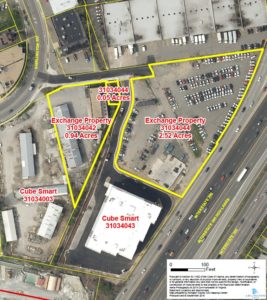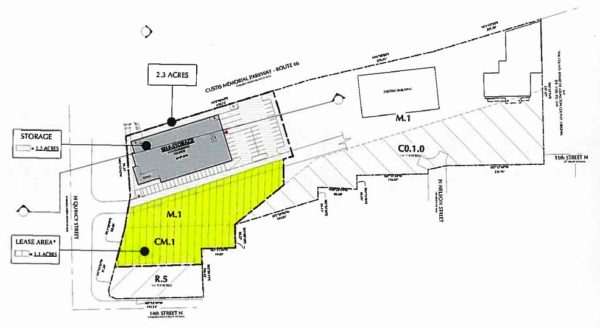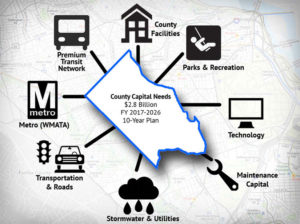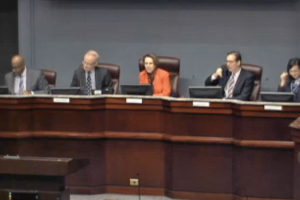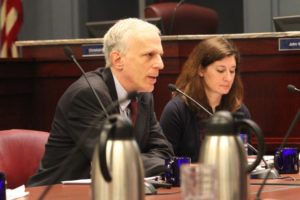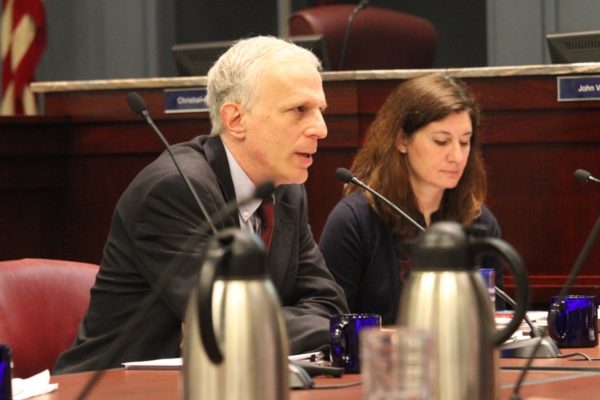
(Updated at 5:30 p.m.) A new $1.2 billion budget proposed by Arlington County Manager Mark Schwartz would boost core services — road paving, streetlight maintenance, public safety, schools and Metro — while raising property taxes to the highest rate since 2001.
The proposed FY 2018 budget is being presented to the County Board this afternoon (Thursday).
Spending under Schwartz’s proposal — drafted with guidance from the County Board — would increase 4.3 percent, while the tax rate would increase by two cents, from $0.991 to $1.011 for every $100 in assessed. That would be Arlington’s highest property tax rate since 2001, when it was $1.023.
The rate increase would come on top of rising property assessments — up 2.9 percent this year. The total tax and fee burden on the average Arlington homeowner would rise by $308 to $8,613 under Schwartz’s proposal, which will now be considered by the County Board after a series of work sessions and public hearings. That’s up from $7,745 three years ago, in 2014.
Final adoption of the new budget is scheduled for April 22, while the Arlington Public Schools budget — Superintendent Dr. Patrick Murphy is presenting his proposed budget tonight — is scheduled to be adopted on May 4.
Last year, Schwartz proposed a half-cent property tax rate decrease, which was then adopted by the Board. This year, Schwartz says more revenue is necessary to fund the “clearly extraordinary needs of Metro and APS.”
The two-cent rate increase itself is expected to bring in an additional $14.8 million in on-going revenue. Much of that is earmarked by Schwartz for an overall $21.2 million increase in funding for Arlington Public Schools, which is experiencing a prolonged period of enrollment growth, and additional funding for Metro, which is also set to receive $22 million in bond funds from Arlington for capital projects.
“It is never easy to recommend an increase in property tax rates, but Metro and our public schools are both vitally important to our County’s continued prosperity, and both are in urgent need of additional funding,” Schwartz said in a press release.
Other areas of spending increases, as outlined in the press release and in a press briefing Thursday morning, include streetlight maintenance, road paving, facilities maintenance, land acquisition, public safety and economic development.
Schwartz said streetlight maintenance and road maintenance, in particular, were identified as top priorities in resident satisfaction surveys.
The number of county-owned streetlights has increased 40 percent over the past five years, contributing to an average repair time of 30 days for minor outages and up to 120 days for major outages. Under the proposed budget, there would be an $910,000 increase in streetlight and trail light funding, adding five new full-time positions, two vehicles, a consultant, equipment and supplies, with the goal of reducing the length of minor repairs to 3 days and major repairs to 1-2 months.
“It’s a safety issue,” Schwartz said of dark streetlights. “People want their government to do the basics before other things.”
Road paving, meanwhile, would receive a $3.3 million boost in funding, with $15.2 million budgeted by Schwartz in FY 2018. Arlington has accelerated its paving program over the past few years, with the goal of raising the county’s Pavement Condition Index to the “high 70s” on a 1-100 scale, according an official at the briefing.
Schwartz’s budget includes $3.5 million for maintenance of synthetic turf fields and other county facilities, $2 million for land acquisition, $250,000 in grants to connect businesses to the county’s ConnectArlington fiber network, a new economic development employee focused on assisting child care businesses, and a 3.25 percent merit salary increase for county employees.
Also included are seven additional sheriff’s deputies, three additional 911 call-takers three additional police officers, all funded “through reallocation of existing resources,” plus two large fire department recruit classes to make up for projected retirements and other attrition.
“[The budget] continued the multi-year-focus on the three priorities I have laid out: economic development, service delivery and transparency, and strategic budget planning and fiscal sustainability, while addressing the core service demands of the County mainly through budget reallocations,” said Schwartz.
Schwartz proposes raising a number of county fees, to “bear a reasonable relationship to the service for which the fee is imposed,” including:
- Raising the household solid waste rate by $6.88 to $314.16 annually
- Raising the water/sewer rate by 35 cents to $13.62 per thousand gallons, an estimated annual increase of $24.50 per household
- New “accessory homestay” (Airbnb, etc.) permit fee of $60
- An unspecified increase in aquatics and gymnastics program fees “to meet the increased capacity in the programs.”
The public budget and tax/fee hearings are scheduled for March 28 and 30.
 A group that wants to use the Reevesland farmhouse as an educational center is making one last push to convince Arlington County not to sell it.
A group that wants to use the Reevesland farmhouse as an educational center is making one last push to convince Arlington County not to sell it.

